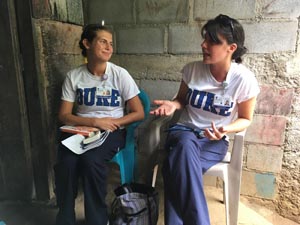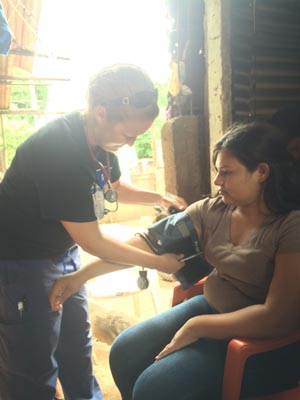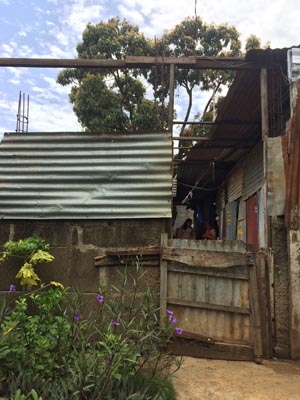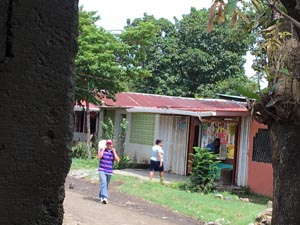 One of the largest components of our day was working with our three families that live in the La Libertad neighborhood served by CAESC (The UPOLI nursing school-run health education center). We were divided into groups of three – two Duke students and one UPOLI student – and each group worked with one family. We used a document called “Historia de Salud Familiar” (Family Health History) which was from the Nicaraguan Ministry of Health to gather pertinent health information. (It looked very similar to several of the assessment sheets that we use in the USA.
One of the largest components of our day was working with our three families that live in the La Libertad neighborhood served by CAESC (The UPOLI nursing school-run health education center). We were divided into groups of three – two Duke students and one UPOLI student – and each group worked with one family. We used a document called “Historia de Salud Familiar” (Family Health History) which was from the Nicaraguan Ministry of Health to gather pertinent health information. (It looked very similar to several of the assessment sheets that we use in the USA.
For about an hour each day over a two-week period, we worked with our assigned family by doing a head to toe assessment on two to three family members, health histories and a home assessment.
 In the individual assessment, we learned about their personal health history, gathered a family health history and found out of they were taking any medications. Many times we did not know the words to describe what we needed our family member to do, so asking them to copy our actions became very important, especially when it came to range-of-motion assessments.
In the individual assessment, we learned about their personal health history, gathered a family health history and found out of they were taking any medications. Many times we did not know the words to describe what we needed our family member to do, so asking them to copy our actions became very important, especially when it came to range-of-motion assessments.
We were able to observe how social determinates of health affect each person, family and the community they live in. One determinant of health that was evident to me was the inability to easily afford fresh fruits and vegetables. Most families were only able to purchase these once a week, as they were too expensive to have available for every meal. This affects the health of all in the family, but especially young children and diabetics.
 One tool that most students felt uncomfortable completing was the home assessment. Most students did not want to encroach on their family by asking if they could view the inside of their home. However, the families were all gracious in allowing us to view inside. They would often point out the luxuries that they had, like two refrigerators or a home computer. The looks of a home were often deceiving of what you would find inside.
One tool that most students felt uncomfortable completing was the home assessment. Most students did not want to encroach on their family by asking if they could view the inside of their home. However, the families were all gracious in allowing us to view inside. They would often point out the luxuries that they had, like two refrigerators or a home computer. The looks of a home were often deceiving of what you would find inside.
The second week in Nicaragua was focused on health interventions. Each group selected one to two areas where the families could potentially improve their overall health. We would prepare small lessons to teach them about these areas. Many of our families had similar health concerns, and we were able to talk with each other on how to prepare our interventions.
 Health interventions were tailored to each individual and family based on information gathered and implemented throughout the two weeks. Among interventions carried out were nutrition education sessions for a diabetic woman using a Latino MyPlate format (culturally appropriate); provision of a pictorial exercise guide and log book for a hypertensive client, with a demonstration and teach-back session; and a medication justification process for two elderly women clients, complete with home-made medication boxes (pencil cases converted by using popsicle stick dividers!).
Health interventions were tailored to each individual and family based on information gathered and implemented throughout the two weeks. Among interventions carried out were nutrition education sessions for a diabetic woman using a Latino MyPlate format (culturally appropriate); provision of a pictorial exercise guide and log book for a hypertensive client, with a demonstration and teach-back session; and a medication justification process for two elderly women clients, complete with home-made medication boxes (pencil cases converted by using popsicle stick dividers!).
- Kelly Brown, ABSN Student